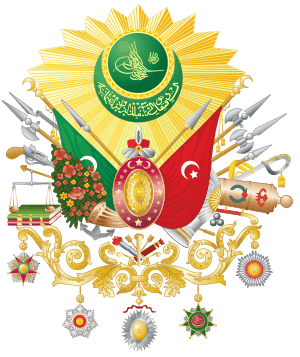Sanjak of Delvina
The Sanjak of Delvina (Turkish: Devline Sancağı, Albanian: Sanxhaku i Delvinës) was one of the sanjaks of the Ottoman Empire which county town was Delvinë but during the 18th century became Gjirokastër, Albania. It was created in the middle of 16th century[1] and disestablished after the Balkan Wars in 1913. Its territory was divided among newly established short lived states: the Principality of Albania and Autonomous Republic of Northern Epirus.
| Sanjak of Delvina | |||||||||||
|---|---|---|---|---|---|---|---|---|---|---|---|
| sanjak of Ottoman Empire | |||||||||||
| 16th century–1913 | |||||||||||
 Coat of arms
| |||||||||||
.png) | |||||||||||
| Capital | Delvinë, Ergiri (present day Gjirokastër) | ||||||||||
| History | |||||||||||
• Established | 16th century | ||||||||||
| March 3, 1913 1913 | |||||||||||
| |||||||||||
| Today part of | |||||||||||
Name
During the 18th century the local Pasha moved the seat of the sanjak from Delvine to Gjirokastër. Its official named didn't change, however it was also referred as Sanjak of Gjirokastër.[2]
History
Before the Sanjak of Delvina has been established in the middle of 16th century Delvina was a seat of kaza which belonged to the Sanjak of Avlona.[3] Sanjak of Delvina had the lowest income of 21 sanjaks in Eyalet Rumelia[4] In 1713 sanjakbey of Delvina was Selim Pasha.[5] In 1744 sanjakbey of the Sanjak of Delvina was Veli Beg.[6] In 1785 Veli Beg's son, Ali Pasha, became a governor of Delvina, while in the following years the sanjak was part of the Pashalik of Yanina.[7] In 1804 the sanjabey of Delvina was Veli Pasha who was also a beglerbey of Rumelia Eyalet.[8] In 1834 Mahmood Hamdi pasha was appointed to govern the Sanjak of Delvina, Yanina and Avlona.[9]
During the Balkan Wars and the subsequent Ottoman defeat, the Greek Army entered the city at March 3, 1913.[10] In June 1914 the town hosted the constituent assembly of the representatives of Northern Epirus that discussed and finally approved the Protocol of Corfu, on July 26, 1914.[11] Delvino then became part of the short-lived Autonomous Republic of Northern Epirus.
References
- Delvina, Sherif (2006). Low Albania (Epirus) and Cham issue. Eurorilindja.
Afterwards, when the sandjak of Delvina has been created (about the middle of XVI century),
- Mikropoulos, 2008: 330-331
- Todorov, Nikolai (1998). Society, the city and industry in the Balkans, 15th-19th centuries. Ashgate. p. 238. ISBN 9780860786597. Retrieved 12 September 2011.
the sandzak of Vlora included the regions Muzeqeja, Laberia (with Belgrad), Berat, Gjirokastra and Delvina.
- Kemal Çiçek; Ercüment Kuran; Nejat Göyünç; İlber Ortaylı (2000). The Great Ottoman-Turkish Civilisation. Yeni Türkiye. ISBN 978-975-6782-19-4. Retrieved 24 July 2013.
Among 21 sanjaks of the Rumelia Beylerbeyiligi, the Morean sanjakbeyi the highest income with 507.760 ak^e while the Delvine sanjak had the lowest income with 157.032 akp.
- Orhan Kılıç (1997). 18. yüzyılın ilk yarısında Osmanlı Devleti'nin idari taksimatı. Eyalet ve sancak tevcihatı. Şark Pazarlama. p. 91. ISBN 978-975-96309-0-4. Retrieved 25 July 2013.
- Društvo istoričara Srbije (1969). Iz istorije Albanaca (From the history of Albanians) (in Serbian). Zavod za izdavanje udžbenika SR Srbije. p. 78. Retrieved 14 September 2011.
родио се 1744. године у околини Тепелене, од оца Вели-бега, госпо- дара Тепелене, односно управљача делвинског санџака. (He was born in 1744 and his father was lord of Tepelene and lord of the Sanjak of Delvina)
- Mikropoulos, 2008: 334, 337
- Michalis N. Michael; Matthias Kappler; Eftihios Gavriel (2009). Archivum Ottomanicum. Mouton. p. 175. Retrieved 25 July 2013.
When Veli Pasa was the governor of the sub-province of Delvine and derbender basbugu in 1804, he was honored with the title of Rumeli Beglerbeyi.
- sir Grenville Temple Temple (10th bart.) (1836). Excursions in the Mediterranean. p. 277. Retrieved 23 July 2013.
Mahmood Hamdi pasha confirmed to the sanjaks of Yanina, Delvina, and Avlonia
- Veremis, John S. Koliopoulos & Thanos M. (2010). Modern Greece : a history since 1821 (1. publ. ed.). Malden, MA: Wiley-Blackwell. p. 73. ISBN 978-1-4051-8681-0.
- Kondis Basil. Greece and Albania, 1908-1914. Institute for Balkan Studies, 1976, p. 132: "Throughout the period of the constituent assembly which convoked at Delvino to discuss the Corfu agreement... the constituent assembly approved the agreement on July 26, 1914."
Sources
- Mikropoulos, Tassos A. (2008). Elevating and Safeguarding Culture Using Tools of the Information Society: Dusty traces of the Muslim culture. Earthlab. ISBN 978-960-233-187-3.